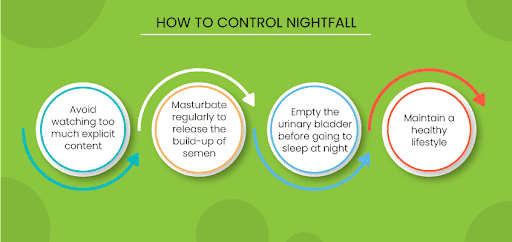Introduction
Sex is a taboo topic in many societies. Consequently, the lack of sex education in the general public has led to many misconceptions about sex and sexual organs. In men, one such topic is nightfall or nocturnal emissions, also called wet dreams.
Nightfall starts during puberty, an age where teenagers undergo physiological changes in their sexual organs. They are too shy to talk about it with anyone and thus cannot understand the facts. They get scared and feel guilty when they experience nightfall. Many consider nightfall a health issue when it is a perfectly normal bodily function that happens to many. This article aims to bust the myths around nightfall by providing readers with the science behind nightfall.
Our Wellness Programs
What is nightfall?
Nightfall is the involuntary ejaculation of semen while sleeping. It starts around puberty, and it is normal to experience nightfall 2-3 times a week for adolescent boys. The frequency decreases with age and with an increase in sexual activity.
Nightfall happens when semen is not released during sex or masturbation and gets stored up. This excess semen passes while sleeping. It is a myth that nightfall causes weakness or decreases sperm count and fertility in men. New sperms constantly replace the old ones given during ejaculation.
Nightfall can occur due to many reasons. Dreams with sexual content, watching a lot of porn, or talking too much about sex can stimulate the subconscious mind and increase the frequency of nightfall. A simple explanation is that the penis gets stimulated when it rubs against the blanket while sleeping, which can be a reason for nightfall. More reasons for nightfall are discussed in detail later in the article.
Looking for services related to this subject? Get in touch with these experts today!!
Experts

Davis Emerson

India
Psychologist
Experience: 6 years

Manveen Kaur

India
Psychologist
Experience: 9 years

Esha M. Puneyani

India
Psychologist
Experience: 14 years
What are Wet dreams: Common reasons behind nightfall
Wet dreams, or nocturnal emissions, are normal and healthy. They’re a sign that your body is maturing sexually. During a wet dream, boys ejaculate while sleeping.
With puberty, males start producing the sex hormone testosterone, which promotes the development of sex organs and the production of sperms. Many teenagers can experience involuntary erections in a day. The build-up of semen and erections can cause spontaneous ejaculation during sleeping in the form of nightfall.
Though wet dreams can underlie a health issue, in most, nightfalls are harmless. They’re nothing to be concerned about and generally don’t cause any physical or psychological harm even when frequent. But, one can seek help if they occur so frequently that they affect regular life.
What are common reasons behind nightfall:
- Prolonged absence of sexual activity and ejaculation.
- Too much exposure to porn or sexually explicit material.
- Excessive genital stimulation.
- Obesity.
- Inflammation of the prostate gland.
- Weaken nerves or muscles due to chronic comorbidities such as diabetes, multiple sclerosis, etc.
- Stress and anxiety.
- Inactive lifestyle.
- Sleep with a full bladder
- Take testosterone supplements.
- Side effects of certain medicines

How to control nightfall-10 Facts about it?
Nightfall, or nocturnal emissions, is a regular occurrence in many men. But if it stops the person from leading their life comfortably, then it is essential to change lifestyle and seek help from an expert.
Here are some ways to control nightfall.
- Avoid watching too much explicit content.
- Masturbate regularly to release the build-up of semen.
- Empty the urinary bladder before going to sleep at night.
- It can be a prostatitis symptom if you experience pain while urinating or see traces of blood in the semen or urine. Prostatitis can also increase the incidences of nightfall. Consult a doctor who might prescribe you a course of antibiotics to treat prostatitis.
- Before going to bed, practise meditation or listen to relaxing music for a night of undisturbed sleep.
- Exercise regularly and maintain a healthy weight.
- Practise yoga asanas such as Uttanapadasana, Kandharasana, and Brahmacharyasana that help control nightfall.
- Consume foods such as yoghurt, sage tea, and almond milk that may help reduce nightfall.
- Consult a doctor about the proper dosage and the side effects of taking hormone supplements or other medication
- Maintain a healthy lifestyle.
Is nightfall genetic?
There is no evidence to suggest that nightfall is genetic.
For centuries, traditions and cultures passed from one generation to another influenced human behaviour. India is conservative when it comes to the culture of sex and sexuality.
It means that few truly understand the topic of sexuality since any talk about it is forbidden, especially in educational institutions which guide the youth in their formative years.
As a result, many misconceptions and pseudo-scientific explanations take prominence when discussing sex and sexuality. A part of Indian culture wrongly states that semen is a precious body fluid and claims frequent masturbation is a ‘threat’ to a man’s health. Though there is ample evidence that all these are myths without a scientific basis, many continue to believe them. It is primarily due to a lack of open and scientific public discourse about puberty and sex. Many still think that nightfall can decrease ‘manliness.’
Is it ok to be ashamed of Nightfall?
There is nothing to be ashamed of at nightfall. It is a natural occurrence among young men, and there is no need to feel embarrassed about it. Lack of open communication is the main reason behind the misconceptions and guilt associated with nightfall. Sex education can be an empowering tool to break down these barriers. It can provide accurate information about human sexuality and sexual health. Research suggests that effective sex education can reduce risky sexual behaviours and promote positive ones, both of which are likely to impact the incidences of nightfall.
Conclusion
Nightfall, or wet dream, is a regular and healthy occurrence for many boys and men. Nightfall is not always a problematic health issue and not an issue of concern. It’s usually not a sign of anything serious unless it is excessive.
Several factors lead to excessive nightfall, including hormonal imbalance and underlying health conditions. If you think that your nightfall is too frequent or in large quantities, consult a medical expert for a thorough diagnosis.
Visit test.unitedwecare.com to read more informative articles on men’s health.
















